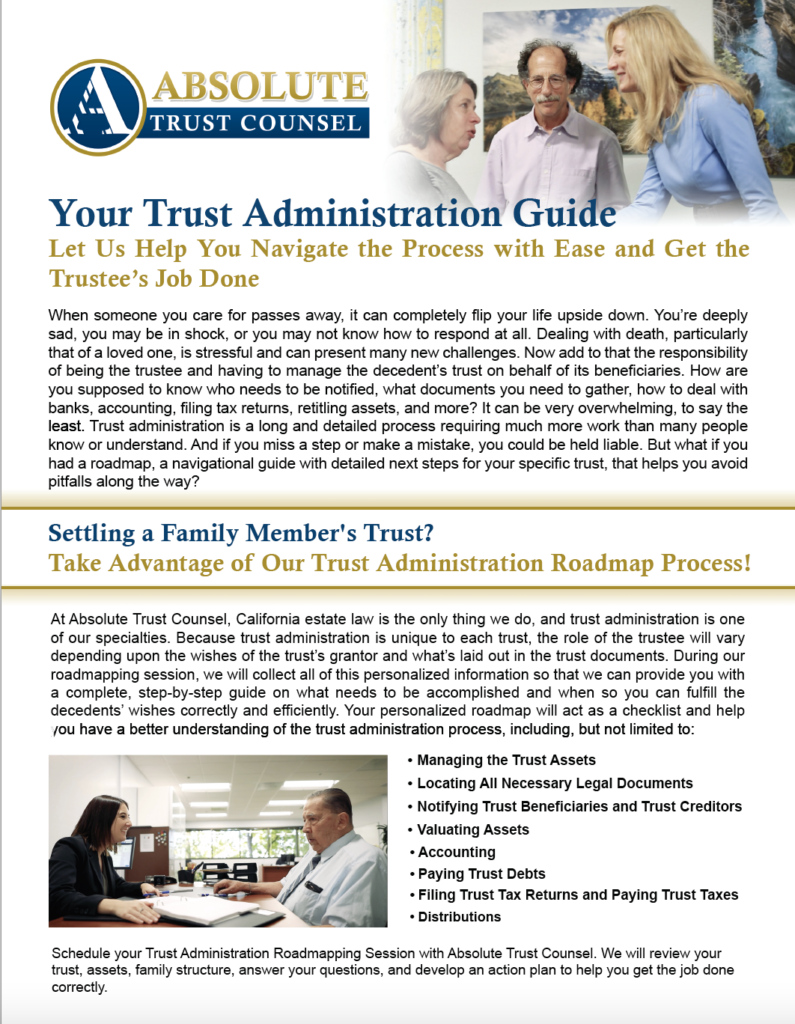There are a number of situations where a borrower doesn’t qualify for a traditional loan and that’s often true in solving the challenges of real estate lending for irrevocable trusts and probate estates. Conventional lenders are reluctant to lend money to these entities, refusing loan approval until the entity has been dissolved and title converted to an individual interest. Heirs and estate managers can be surprised to discover that they cannot obtain financing for the estate and trust administration, even when heirs and trustees are financially qualified and have excellent credit. With the help of flexible, nimble capital, what starts out as a problem can be resolved to benefit all parties to the transaction. Typical irrevocable trust and estate needs include the following:
- Estate expenses, legal costs and debts
- Obligations to heirs (non-pro rata distribution)
- Costs to prepare property for sale or rent
- Paying off a reverse or regular mortgage
- Providing for beneficiary needs in professionally managed estates and conservatorships
Trust and estate needs are varied and sometimes complex, but taking an experienced view toward the real estate component can offer superior results. One common situation occurs when one heir wants to keep the “old family home,” but the trust entity does not have enough cash or investments to “even the equities” among the beneficiaries. That same heir may want to eventually live in the home, or alternatively to convert it to a rental property and hold for long-term investment. Either way, if the irrevocable trust loan is structured correctly, the heir keeping the property may be able to retain 100% of the parent’s Prop.13 property tax basis. A tax advisor or estate planning attorney should be consulted for advice in this area.

Some background: most people living in California are familiar with Prop.13 that was passed in 1978 to hold the line on property tax increases. This law allows property to be reassessed upon a “change in ownership.” Proposition 58, which was adopted later, exempts transfers of a home between parent and child from this reassessment.
When there is only one child, the transfer can be easily handled. Difficulties can arise, however, if there are two, or more, siblings and one wants to keep the house. The transaction must be handled in a special way, called a non-pro rata trust distribution. The sibling keeping the house must find a way to compensate the other siblings for their interest in the trust assets. If the trust does not have adequate cash, this sibling may use his or her own funds to buy out the other sibling(s). Use of separate funds to pay off a sibling’s interest in the property would be deemed a “change in ownership.” This would trigger a reassessment upon a portion of the property. If there are two heirs, and 50% of the property is being retained, then the other 50% would be subject to the reassessment. If there are three heirs and 1/3 of the property is being retained, with 2/3 of the heirs being bought out, then 2/3 of the property would be subject to reassessment. By having the trust estate borrow the funds to distribute to the heirs, the reassessment can be avoided.
To illustrate how this applies, consider the following two examples. In each case, assume the home is the only asset in the estate, has a value of $800,000 and is currently “free and clear” of mortgage debt. The current assessed value is $100,000. Sibling A (“Bob”) wants to keep the house and Sibling B (“Ann”) wants cash for her share:
- Bob raises $400,000 to buy out the interest of Ann. There is a change in ownership as to Bob’s 50% purchase and a reassessment of 50%, resulting in a property tax increase.
- The trust borrows $400,000 from a third-party lender and distributes it to Ann. No change in ownership. No reassessment. No property tax increase. At the same time, the trustee transfers the property to Bob, who will later retire the $400,000 loan through a refinance.
Proposition 58 also allows for application of this parent/child transfer exemption to commercial and multifamily residential properties, but there are limits as to the amount of current value that can be sheltered from reassessment.
The benefit of retaining the Prop.13 property tax basis cannot be understated. For example, a recent loan we funded involved a Berkeley home that was appraised for estate purposes at $1,650,000. If fully reassessed, the property taxes would approximate $21,500. The parent’s annual property taxes were $1,500. Through our financing structure, substantial property tax savings were available to the sibling retaining the property. This huge annual saving may be possible when the trust borrows the funds prior to the final distribution to heirs. This property tax benefit via a third party loan to the trust can be done for a probate estate as well.
As noted above, obtaining financing for an estate or trust can be useful in other situations in addition to sheltering the property from a reassessment. Redwood Mortgage recently funded a $650,000 loan to an irrevocable trust to pay off a $355,000 reverse mortgage and provide some cash out. The property was a single family residence valued at $1,200,000. After our financing, the trust assets consisted of cash reserves of $295,000, plus equity in the property of $550,000. The reserves were used by the trustee to pay trust expenses and for improvements to the property prior to listing the home for sale. The Redwood Mortgage loan was later paid off upon the sale of the house.
Redwood Mortgage offers flexible loan terms, structuring the loan to suit the needs of the estate and the loan exit strategy. Typically, the loan term is one year, but it can be longer. With no prepayment penalty the estate can exit from the loan when the time is right. By working with Redwood Mortgage, trustees and their financial and legal advisors can obtain a win-win solution for everyone.

Jim O’Dea is currently a Broker Associate with Redwood Mortgage, a private money lender. Jim has been with Redwood over 14 years and has been in commercial real estate over 40 years. After graduating from San Francisco State University with degrees in Finance and Accounting, he entered real estate in the mid 70’s at Kaiser Aetna developing business parks. In the 80’s, he was a Senior VP at Harbor Bay in Alameda, responsible for all operations and the 300-acre business park. In the mid 90’s, he started an 8-year stint as the Director of Real Estate for Heald Colleges, closing over $150 million in transactions, including a $28 million sale-leaseback. For Redwood Mortgage, he has originated and closed over $150 million in loans.
[Ad] Do you need help with your California estate planning now? We can help. Together our Absolute Trust Counsel team will take a look at your situation and your specific needs to develop a strategic plan to help protect you and your loved ones. Here’s a link to schedule your free discovery today > https://absolutetrustcounsel.com/scheduling/.
Looking for more information on probate? Visit our probate resource page at https://absolutetrustcounsel.com/practice-areas/probate/ for guidebooks, podcasts, videos, and more!
 Navigate the Administration of a Family Member’s Trust with Ease
Navigate the Administration of a Family Member’s Trust with Ease
The job of a trustee isn’t as easy as one may think. You must give legal notices, retitle assets, file tax returns, understand a legal document, and perform a variety of tasks most people find unfamiliar. As a trustee, if you forget a step or make a mistake, you could be held liable.
Protect yourself, have a plan, and find out the next steps about your specific trust. Get started now by scheduling a 20-minute discovery call with Absolute Trust Counsel. During this introductory call, we will gather information about your trust administration, review our trust administration process with you, and answer any questions you may have. Our goal is to help you get the job done right!
Your Trust Administration Guide
Let Us Help You Navigate the Process with Ease and Get the Trustee’s Job Done

Trust administration is a long and detailed process requiring much more work than many people know or understand. And if you miss a step or make a mistake, you could be held liable. Download a copy of our Trust Administration Flyer for more information on our roadmapping session and how to get started.




